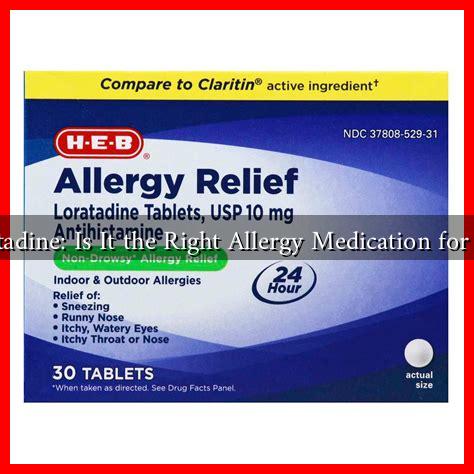-
Table of Contents
Loratadine: Is It the Right Allergy Medication for You?
Allergies can be a significant source of discomfort for millions of people worldwide. From seasonal hay fever to pet dander, the symptoms can range from mild to severe. One of the most commonly prescribed medications for allergy relief is Loratadine. But is it the right choice for you? In this article, we will explore what Loratadine is, how it works, its benefits, potential side effects, and considerations for use.
What is Loratadine?
Loratadine is a second-generation antihistamine that is primarily used to treat allergic rhinitis (hay fever) and chronic urticaria (hives). Unlike first-generation antihistamines, Loratadine is less likely to cause drowsiness, making it a popular choice for those who need to maintain their daily activities without sedation.
How Does Loratadine Work?
Loratadine works by blocking the action of histamine, a substance in the body that causes allergic symptoms. When allergens enter the body, histamine is released, leading to symptoms such as sneezing, itching, and runny nose. By inhibiting histamine’s effects, Loratadine helps alleviate these symptoms.
Benefits of Loratadine
There are several advantages to using Loratadine as an allergy medication:
- Non-Drowsy Formula: One of the most significant benefits is its non-sedating properties, allowing users to function normally throughout the day.
- Long-Lasting Relief: Loratadine provides relief for up to 24 hours, making it convenient for daily use.
- Wide Availability: It is available over-the-counter, making it easily accessible without a prescription.
- Minimal Side Effects: Compared to first-generation antihistamines, Loratadine has fewer side effects, particularly in terms of sedation.
Potential Side Effects
While Loratadine is generally well-tolerated, some individuals may experience side effects. Common side effects include:
- Headache
- Dry mouth
- Fatigue
- Gastrointestinal disturbances
In rare cases, more severe side effects may occur, such as rapid heartbeat or allergic reactions. It is essential to consult a healthcare provider if you experience any unusual symptoms.
Who Should Use Loratadine?
Loratadine is suitable for many individuals suffering from allergies, but it may not be the best choice for everyone. Consider the following:
- Age: Loratadine is approved for use in children over the age of two, but dosage adjustments may be necessary.
- Pregnancy and Breastfeeding: Pregnant or breastfeeding women should consult their healthcare provider before using Loratadine.
- Existing Health Conditions: Individuals with liver or kidney issues should discuss their options with a healthcare professional.
Case Studies and Statistics
According to a study published in the Journal of Allergy and Clinical Immunology, Loratadine was found to be effective in reducing symptoms in 80% of participants with allergic rhinitis. Another study indicated that patients reported a significant improvement in their quality of life after using Loratadine for just two weeks.
Conclusion
Loratadine is a widely used and effective medication for managing allergy symptoms. Its non-drowsy formula, long-lasting relief, and minimal side effects make it a popular choice among allergy sufferers. However, it is essential to consider individual health conditions and consult with a healthcare provider to determine if Loratadine is the right medication for you. By understanding your options and the potential benefits and risks, you can make an informed decision about your allergy management.
In summary, Loratadine offers a reliable solution for many individuals dealing with allergies, but personal health factors should always guide medication choices. Always consult with a healthcare professional for personalized advice.

